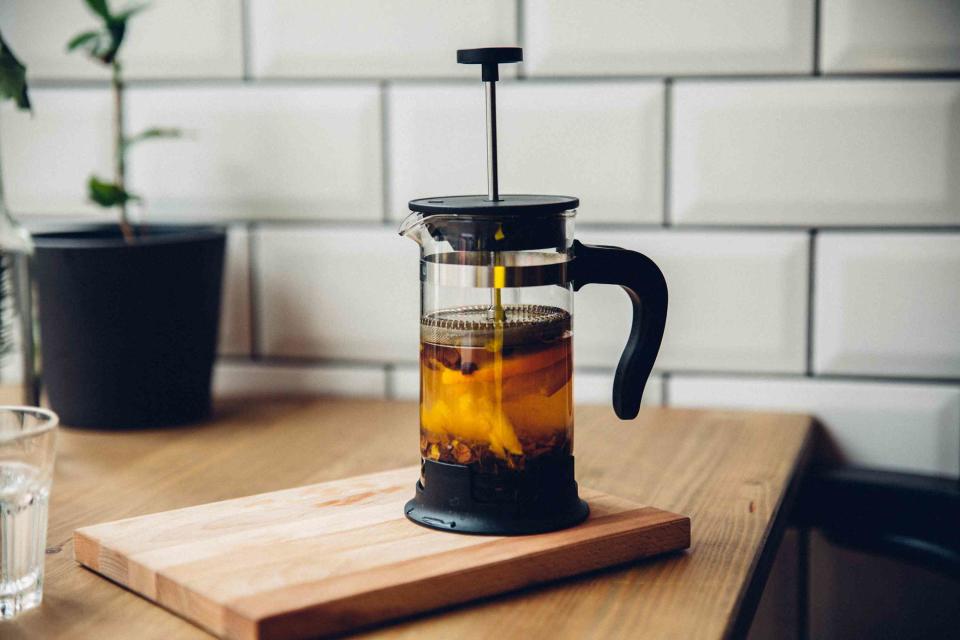This Is the Best Coffee for Cold Brew, French Press, and More
Lost on which coffee beans to buy? We can help!

Katarna Mittkov/Getty Images
There’s a lot to consider when making a cup of coffee, from which coffee maker to use to which coffee beans to buy. Here, we’re tackling the latter: which coffee beans to buy for five of the most popular at-home brewing methods. We spoke with coffee expert and content creator Ethan Rode to get his take on the subject, and he had great advice for us. As he put it, “The best coffee beans are always the ones that you enjoy the most.”
For more detailed suggestions, including the best coffee for cold brew and the best coffee for espresso, scroll down. And as you’re reading, just remember that the following recommendations are just that—recommendations. For a coffee that really suits you and your taste buds, it’s best to play around with beans and brews so you can craft your perfect cup.
Related:What's the Difference Between Cold Brew, Pour-Over, and More Types of Coffee?
Best Coffee for Cold Brew
Cold brew is made by adding coarsely ground coffee to water that’s room-temperature or below, and steeping it for up to 24 hours. The long brew time translates to a higher amount of caffeine, as well as a sweeter flavor profile. When choosing coffee beans for cold brew, Rode suggests medium to dark-roast coffee beans with low acidity and full-bodied flavors. For cold brew, we prefer sweet notes that will play up the coffee’s natural sweetness; chocolate, brown sugar, hazelnut, and molasses are all good tasting notes to look for. Try beans from Brazil or Colombia, like Peet’s Brazil or Counter Culture’s Gradient.
Best Coffee for French Press
French press is a popular form of immersion brewing, which just means that the coffee grounds are immersed in water for a set time, similar to cold brew. Immersion brewing yields a more robust, full-bodied coffee than the alternative—percolation. Also like cold brew, the French press is best suited to medium to dark-roasted coffee beans with sweeter notes. If you like adding milk and sugar to your coffee, French press might be a good brewing method for you. Rode recommends Ethiopian beans, which he describes as having “balanced acidity and a full-bodied flavor.” Try Rêve’s Ethiopia Yirgacheffe, or Browny’s Ethiopia.
Related:5 Mistakes You're Making With Coffee That Are Ruining Your Brew
Best Coffee for Espresso
For starters, you should know that any kind of coffee can be used for espresso; the ones labeled “espresso” just signify an extra dark roast. We actually prefer regular dark roast coffee beans for espresso, since they still maintain depth of flavor. Rode suggests looking for beans with “chocolatey and nutty flavor notes” for a rich, balanced shot of espresso. Try Intelligentsia’s El Diablo or Starbucks’ Caffè Verona for at-home espresso that doesn’t disappoint.
Best Coffee for Moka Pot
Channeling your inner Italian? Try making coffee with a moka pot, otherwise known as a stovetop coffee maker that brews by passing steam-pressurized boiling water through ground coffee. For this method, we recommend looking for medium-roasted coffee beans for a smooth, balanced result. A too-dark roast tends to over-extract in a moka pot, which causes bitterness. For a moka pot, Rode looks for coffee beans with a “bold, nutty flavor profile, such as Brazilian or Guatemalan beans.” Try La Colombe’s Brazil Beleza, or Stumptown’s Guatemala El Injerto Bourbon.
Related:5 Buzz-Worthy Coffee Cocktail Recipes That Are So Simple to Make
Best Coffee for Pour Over
Many coffee aficionados consider pour-over the best method for a consistently high-quality cup of coffee. With a pour-over, you have more control over the brewing process, so it’ll take time to master, but it’s well worth it if you’re particular about your cup of java. The pour-over method makes a clean, sediment-free coffee that tastes nuanced and smooth. We suggest light to medium-roasted coffee beans for pour-over brewing, which allow you to taste the whole spectrum of flavors in the coffee. Rode finds that Ethiopian and Kenyan beans tend to yield a clean, bright cup of pour-over coffee. Try Equator’s Atelier Crenn Blend, or Joe Coffee’s Kenya Livine Osiemo.
For more Real Simple news, make sure to sign up for our newsletter!
Read the original article on Real Simple.

